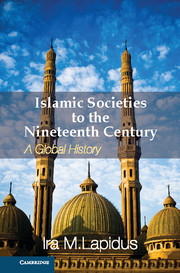Book contents
- Frontmatter
- Contents
- List of Illustrations
- List of Figures
- List of Maps
- List of Tables
- Preface
- Acknowledgments
- Acknowledgments to the first edition of A History of Islamic Societies
- Acknowledgments to the second edition of A History of Islamic Societies
- Publisher's Preface
- Introduction to Islamic Societies
- Part I The Beginnings of Islamic Civilizations
- Part II From Islamic Community to Islamic Society
- Part III The Global Expansion of Islam from the Seventh to the Nineteenth Centuries
- Chapter 25 Introduction: Islamic Institutions
- The Western Islamic Societies
- Islam in Asia
- Chapter 30 Introduction: Empires and Societies
- Chapter 31 The Turkish Migrations and the Ottoman Empire
- Chapter 32 The Postclassical Ottoman Empire: Decentralization, Commercialization, and Incorporation
- Chapter 33 The Arab Provinces Under Ottoman Rule
- Chapter 34 The Safavid Empire
- Chapter 35 The Indian Subcontinent: The Delhi Sultanates and the Mughal Empire
- Chapter 36 Islamic Empires Compared
- Chapter 37 Inner Asia From the Mongol Conquests to the Nineteenth Century
- Chapter 38 Islamic Societies in Southeast Asia
- Islam in Africa
- Conclusion
- Glossary
- Bibliography
- Annotated Bibliography from A History of Islamic Societies, 2nd Edition
- Index
Chapter 30 - Introduction: Empires and Societies
Published online by Cambridge University Press: 05 February 2013
- Frontmatter
- Contents
- List of Illustrations
- List of Figures
- List of Maps
- List of Tables
- Preface
- Acknowledgments
- Acknowledgments to the first edition of A History of Islamic Societies
- Acknowledgments to the second edition of A History of Islamic Societies
- Publisher's Preface
- Introduction to Islamic Societies
- Part I The Beginnings of Islamic Civilizations
- Part II From Islamic Community to Islamic Society
- Part III The Global Expansion of Islam from the Seventh to the Nineteenth Centuries
- Chapter 25 Introduction: Islamic Institutions
- The Western Islamic Societies
- Islam in Asia
- Chapter 30 Introduction: Empires and Societies
- Chapter 31 The Turkish Migrations and the Ottoman Empire
- Chapter 32 The Postclassical Ottoman Empire: Decentralization, Commercialization, and Incorporation
- Chapter 33 The Arab Provinces Under Ottoman Rule
- Chapter 34 The Safavid Empire
- Chapter 35 The Indian Subcontinent: The Delhi Sultanates and the Mughal Empire
- Chapter 36 Islamic Empires Compared
- Chapter 37 Inner Asia From the Mongol Conquests to the Nineteenth Century
- Chapter 38 Islamic Societies in Southeast Asia
- Islam in Africa
- Conclusion
- Glossary
- Bibliography
- Annotated Bibliography from A History of Islamic Societies, 2nd Edition
- Index
Summary
Within the global framework of Muslim regimes and societies, the great Muslim empires of the Middle East and South Asia – the Ottoman, the Safavid, and the Mughal – were linked by shared historical, ethnic, and cultural traditions. Western scholarship has been preoccupied by their similarities and differences from the states of Western Europe. Karl Wittfogal's Oriental Despotism characterized Asian empires as centralized, authoritarian, monolithic, and despotic regimes that governed subordinate and supine societies; as opposed to Western societies, which were seen as ruled by law (rather than tyrants). The West was the domain of autonomous classes (nobility, clergy, and bourgeoisies), of autonomous collective institutions (communes, councils, parliaments, courts, guilds, and other corporations), and of free men.
This extreme dichotomy is challenged by revisionist scholars. In recent work, East and West are no longer seen as having separate histories. They develop in the same global context. As early as the eleventh or thirteenth centuries, depending on different authors, there was already a global system of political and economic interaction. War and trade brought empires and states into close interaction and awareness of technological, military and administrative, intellectual, scientific, and artistic developments. In both Asian and European societies, there was a trend toward the consolidation of centralized states that dominated local nobles, warlords, tribes, and other potentially autonomous forces. This was partly due to new military tactics (the use of gunpowder weapons), international trade, and new financial and administrative methods. Competition among these states and empires led to intensified warfare and new military technologies, mobilization of resources from the population (or simple exploitation), and sometimes the promotion of economic development. International trade was also a powerful factor in the interrelated growth of early modern empires. From the fourteenth century onward, throughout Eurasia, political regimes were becoming larger, more powerful, and more centralized.
- Type
- Chapter
- Information
- Islamic Societies to the Nineteenth CenturyA Global History, pp. 425 - 426Publisher: Cambridge University PressPrint publication year: 2012



